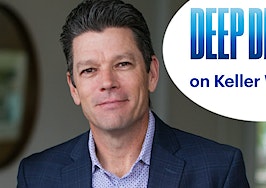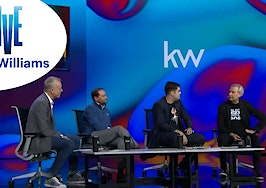
All week, Inman is taking a Deep Dive into Keller Williams. We’re talking to key executives, unpacking its strategic moves and reporting live from the virtual KW Mega Camp, with the goal of telling you everything you need to know about KW right now. Watch for future Inman Deep Dives into top brokerages coming in the months ahead.
It was early 2018 when Gary Keller made his now-famous proclamation about Keller Williams’ future.
“We are a technology company. Number one that means we build the technology. Number two that means we hire the technologists,” Keller said at his company’s Family Reunion conference in February of that year. “We are not a real estate company anymore.”

Vija Williams
Vija Williams was in the room at the time. Williams is the president of the brokerages division at Ben Kinney Companies — a firm that has eight Keller Williams offices — and told Inman that the comment was “provocative” and initially a little confusing.
“I was just like, ‘what?’ We’re a real estate company,” Williams recalled. “When he said ‘technology company’ I didn’t intuitively understand it at the time.”
Keller had gone on to described the current moment as the “fourth industrial revolution” because of the rise of data technology, and Williams said that when the speech was done it was all anyone could talk about.
“It was kind of weird and kind of special,” she recalled.
Three and a half years later, though, Keller Williams is deep into its tech pivot. The franchisor has rolled out a variety of software tools, hired new leadership and stuck to its guns that technology is the future. Of course, Keller Williams isn’t alone in leaning into tech. But it is unique for being a legacy brand that is also building most of its own platforms. No other company has quite made that same pivot so intensely.
To get a sense of how this process is going, Inman recently spoke to both Keller Williams insiders as well as outside observers. The takeaway from these conversations is that the company has made significant progress. Data shows usage of the company’s platforms growing, and executives are actively working to adapt to the needs of users. Outside observers believe Keller Williams still faces some significant hurdles along the way, but users at least seem to be fans of what has happened so far.
“I feel like that was the moment where all of our paradigms started shifting,” Williams ultimately said of Keller’s comments in 2018. “I really think he saw way farther on the horizon than I did. Now it seems like, of course it’s a technology company.”
The vision
In a conversation with Inman, Keller Williams Chief Technology and Digital Officer Chris Cox said the goal of all of the company’s technology efforts is to create a “linked ecosystem” that works at every point in the real estate deal-making process. The company wants that system to be “seamlessly connected” and focused on creating useful and positive experiences.

Chris Cox
“We really are focused on creating an ecosystem that supports the experience of buying, selling and owning a home,” Cox said.
To that end, Keller Williams has rolled out a number of tools. The most prominent of those tools is Command, a customer relationship management (CRM) platform that’s powered by artificial intelligence. Keller Williams spent years developing the platform and first debuted it in 2019. At the time, Keller himself described it as larger, smarter and more comprehensive than any other CRM.
Command won a positive review from Inman in its early days and has since continued to get more features, such as a SmartPlan tool that is designed to foster collaboration between real estate colleagues.
On the other hand, the system has also struggled at times, with Keller admitting earlier this year that in 2020 “bugs showed up more.” He characterized the problem at the time as a war on bugs, and one that his company was losing.
Cox joined Keller Williams in March, and told Inman that in the time since the company has “doubled down on performance stability.”
“Shortly after I arrived here, we launched an initiative that was really focused on performance stability and bug remediation efforts,” he explained. “That was never supposed to be a once and done effort.”
So far, at least, those efforts seem to be working for Command’s users.

Jac Smith
Jac Smith leads an eponymous three-person team in St. Petersburg, Florida. He told Inman he uses Command to run ads, do targeted marketing, create email campaigns, and to stay in touch with people in the team’s database, among many other things. He offered a fairly glowing review of the platform, saying that some bugs notwithstanding he considers Command “one of our spheres” because he and his team rely on it so deeply.
“It’s our life,” he added. “We’re seventh generation on referrals because of Command.”
Aside from some visual design tools, Smith and his team also largely don’t use outside technology, and he noted that he likes the fact that Keller Williams is building its own software resources in-house.
“I don’t want anybody else to have my information,” Smith added. “I’m not going anywhere.”
Williams, of Ben Kinney Companies, offered a similarly positive take on the platform. She said that it is sufficiently useful that it has become a part of her company’s onboarding process.
“A lot of our agents use it for the design work,” she added, “the postcards, the flyers, social media graphics.”
Williams also mentioned occasionally running into bugs in the system and getting the “spinning wheel of death,” but said that overall the software is functional, fast and intuitive.
“We love Command,” she concluded.
The progress
Cox told Inman Command has steadily seen more and more engagement. Right now, there are about 107,000 active monthly users platform, he added.
In Keller Williams most recent earnings report, the company said that between April and June, Command had 104,500 active monthly users, which was up 11 percent compared to the quarter before.
The company also said in its earnings report that during the second quarter, a smart ad campaign tool in Command generated 418,6000 leads across Facebook and Instagram. Additionally, as of June 30 agents have run a total of 56.7 million campaigns through SmartPlans, which the company described in the report as “the automated marketing and task management app with Command.” Those numbers represent “a twofold increase since the end of Q2 ’20,” the report adds.
The point here is that Keller Williams’ numbers show that the platform does appear to be growing.
Cox added that Keller Williams tries to get a “granular” sense of how the platform is resonating with agents, and uses a metric that gauges things like retention, adoption, and task completion, among other things. The company uses those metrics to set development priorities, and according to Cox users have so far indicated overall satisfaction with Command.
“The trend line is very encouraging,” Cox noted.
The challenges
Clearly, Keller Williams certainly has a lot going for it, but some outside observers also think the company will have some major hurdles to overcome as it works to implement its technology vision.

Russ Cofano
Russ Cofano — a long-time industry observer who today is the CEO of technology startup Collabra and who previously served as president of eXp World Holdings, among other real estate leadership positions — praised Keller Williams for having a strong brand and culture and for succeeding on many fronts. But he also said that when it comes to buggy technology, ultimately “agents won’t tolerate that” forever.
“I think what their attempts have shown is that while companies like Keller can throw a large amount of money at this challenge,” Cofano added, “it is extremely difficult to be successful at it.”
Cofano went on to argue two main points. First, that Keller Williams’ size and scope mean the company’s technology has to be many things to many people.
“The challenge with Keller and any brokerage company is, who is their customer? Is it the agent? If it’s the agent which agent? There’s a big difference between an agent that does two deals a year and a team leader. Is it the local broker franchisee? Those segments have different use cases, and what you end up having is potential for a diluted value proposition,” Cofano said.
Asked about the idea that Command has to be all things to all users, Cox argued Keller Williams’ wide net could be an asset because it means more systems are linked and accessible from one central place.
“I think it’s a necessity,” he added of the company’s approach. “In our business, we ultimately have multiple constituencies and stake holders. What differentiates companies that really perform exceptionally in this space is that they figure out a way to do it. They do it with an understanding that this is not a static exercise.”
The second challenge Cofano mentioned is that Keller Williams appears to be betting on a very different strategy compared to other major players like Realogy. Cofano noted that Realogy’s approach to technology is based “more on open architecture,” meaning it integrates with a variety of third-party software platforms — some of which agents may already be using.
The result is that agents in such systems can pick and choose the tools they like from a wider pool of providers, and those providers “can really focus on a specific problem,” Cofano said.

Kyle Handy
Kyle Handy made a similar point.
Handy is an eXp agent in the San Antonio, Texas, area. Among other things, he also blogs about real estate and hosts a YouTube channel. In December, he posted a video comparing eXp to Keller Williams that racked up nearly 20,000 views.
Like Cofano, Handy has praised Keller Williams for its brand, but said that one of the things that ultimately drew him to eXp was the ability to integrate an array of different technology solutions. Friends at Keller Williams, on the other hand, have expressed frustration to Handy that they “can’t incorporate the system that Keller Williams gives them with what they want to use or what they already use.”
“The core of their business model is that they don’t want to integrate,” Handy said.
Inman reached out to several Keller Williams agents who have discussed their technology journey in semi-public online forums. Responses varied, but multiple agents indicated that, while they like Keller Williams, they don’t use Command. They thus declined to publicly go on the record. Such comments suggest that while Keller Williams has many fans in its ranks, at least some of those people still see it as a real estate company rather than a technology company.
Handy also drew a contrast between new companies like eXp or the Real Brokerage, which are centrally owned, and Keller Williams, which operates franchises. Historically, franchises have been a major part of the real estate industry, and they were a way for local entrepreneurs to start businesses without having to entirely build a name from scratch. But Handy suggested that when it comes to technology, that system can potentially become a liability.
“In a franchise system, it’s a lot harder for change to take place,” he argued. “You’ve got to get everybody to agree on things.”
Neither Handy nor Cofano argued that these obstacles were insurmountable. Handy, for example, noted that “only time will tell” what will happen, while Cofano said that Keller Williams may actually be uniquely capable of navigating bumps in the technological road in the end.
“Keller is able to deal with that better than many companies because they have such a strong agent culture,” he said. The fact that both Williams and Smith have encountered bugs but remain fans of Command would seem to support that idea.
As Handy mentioned, time will indeed tell what happens. But in the meantime, Keller Williams’ pivot to technology remains one of the most notable experiments in real estate. And it’s significant that it’s coming from a company that wants to remain invested in the agent experience.
“There’s a clarity of mission around what we do,” Cox said of the company’s approach to tech, “and it’s in service to our agents.”













